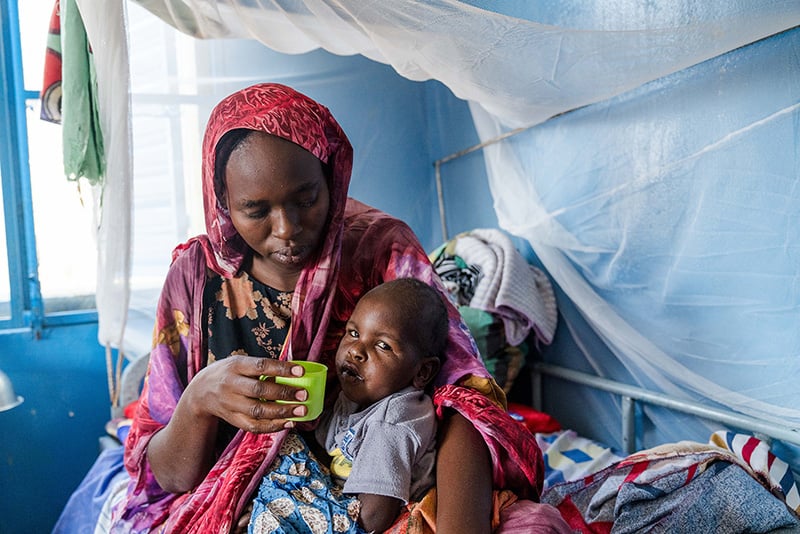WASHINGTON D.C. (June 17, 2025) – Ahead of World Refugee Day, a stark new report from Christian humanitarian organization World Vision reveals the devastating toll that global humanitarian funding cuts are taking on displaced families and children across 13 crisis-affected countries.
The report, “Hunger, harm and harsh choices: the cost of the humanitarian funding crisis on children,” highlights a dangerous surge in hunger, child labor, forced marriage, school dropouts, and child trafficking—much of it concentrated among people who have already been forced to flee their homes and now rely on ever-dwindling humanitarian support.
World Vision surveyed more than 5,000 refugee, internally displaced and host family households where it provides food or cash assistance. Conducted between January and April 2025, the report explored the impact of reduced food assistance on these vulnerable communities. Alarmingly, it found that 58% are now experiencing severe hunger, with nearly half saying they have gone entire days without food.
The findings come as the number of people forcibly displaced are at record levels -according to UNHCR, some 123.2 million people – and as Congress considers deep cuts to U.S. international assistance programs and the Senate votes on rescissions to critical funds already appropriated to humanitarian aid work.
“Around the world, we’re witnessing the worrisome impacts of a deeply distressing trend: humanitarian needs are steadily outpacing the funding required to help,” said Margaret Schuler, World Vision’s senior vice president of international programs. “The gap leaves more people hungry and struggling in the face of extreme hardship. I recently saw this in Chad at the border with Sudan where families fleeing from horrific violence now living in displacement are doing their best to feed their families and keep their children safe.”
In South Sudan, a staggering 97% of families reported that someone in their household had gone a full day and night without eating anything in the past month. Similarly, 89% of families in Ethiopia and the Democratic Republic of Congo said they had endured this level of deprivation. Global cuts to food assistance were directly linked to this suffering—families that had their food rations reduced were over five times more likely to face severe food insecurity.
World Vision is particularly concerned about the dire impact on children. The findings show that children in food-insecure households are eight times more likely to be engaged in child labor and nearly six times more likely to be married early. The likelihood of children being forced to beg increased by more than nine times, and the risk of exposure to violence rose nearly fivefold. One mother from a refugee camp in Uganda said, “My daughter wanted to become a teacher. Now, she spends her days searching for scraps to sell at the market. She’s 12.”
Schuler said the report underscores the importance of U.S. humanitarian assistance and what can happen when that support is taken away.
“Whenever World Vision partners with the U.S. government, we see lives saved, children fed, and regional stability that greatly benefits both vulnerable children and the United States,” she said, noting that thanks to U.S. funding, deaths from AIDS and childhood diseases have been cut in half, millions of lives saved from hunger and starvation, and millions more provided access to clean water.
World Vision is urging Congress to protect funding for lifesaving humanitarian assistance in budget appropriations and in upcoming rescissions votes, especially to those displaced by conflict and disaster and to invest in long-term solutions that help communities secure a future for their children.
“These are the kinds of international assistance investments that reflect the best of American leadership—strategic, sustainable, and rooted in partnership with local communities,” Schuler said. “The time to act is now as the needs are urgent.”
About the Report
This new study is a follow-up to World Vision’s 2024 report, “Ration Cuts: Taking from the Hungry to Feed the Starving” and explores how reductions in food assistance are impacting displaced and host communities. Conducted in partnership with the World Food Programme (WFP), the report draws on data from 13 crisis contexts, including Syria, Lebanon, Bangladesh, Myanmar, Somalia, Ethiopia, South Sudan, Uganda, Mali, Central African Republic, and the Democratic Republic of Congo. Over 5,000 households were surveyed, along with focus groups and expert interviews, to assess the links between food insecurity and education, child protection, mental health, and family coping strategies.
The report does not claim to represent entire national populations but instead offers a stark snapshot of the lived realities of displaced families facing the most extreme impacts of aid cuts.
About World Vision:
World Vision is a Christian humanitarian organization dedicated to working with children, families and their communities worldwide to reach their full potential by tackling the causes of poverty and injustice. Motivated by our faith in Jesus Christ, we serve alongside the poor and oppressed as a demonstration of God’s unconditional love for all people. World Vision serves all people, regardless of religion, race, ethnicity or gender. For more information, visit worldvision.org or follow on X @WorldVisionUSA.
